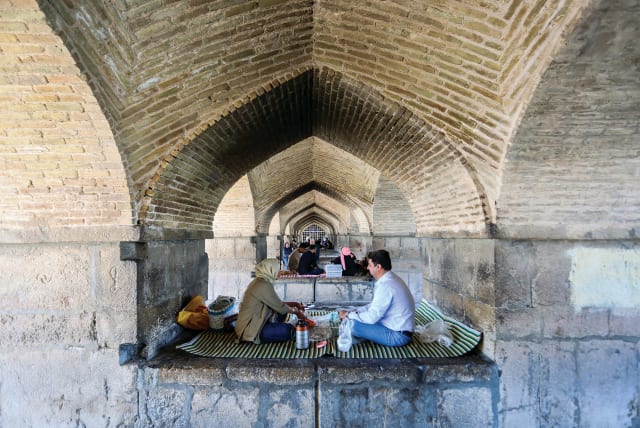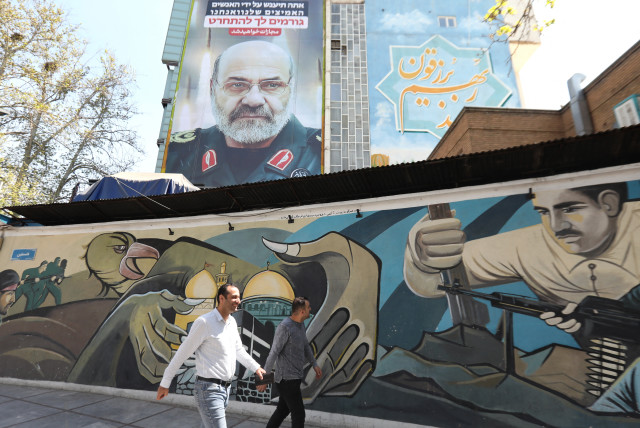Voices from the Arab press: Israel and the question of deterrence

A weekly selection of opinions and analyses from the Arab media around the world
Israel and the question of deterrence
Al-Ittihad, UAE, April 27
The Israeli government is currently focused on closely monitoring and assessing Iranian actions, particularly following the recent Israeli strike on Isfahan. This surveillance is being conducted within a specific framework that has been established through the agreement of Israeli military leadership and intelligence services.
Despite the advancements in Iran’s military capabilities, including drones and missiles of various ranges, the threat posed to Israeli national security has been limited in previous years, even after the Isfahan strike. Israel’s robust defense systems, such as the Iron Dome (being modernized in collaboration with the US), David’s Sling, and Red Sky, ensure that the skies over Israel remain secure. Any potential challenges from adversaries will be promptly addressed.
Despite the rhetoric in Israeli media and politics, the primary goal is to garner support for Israel and reinforce the Western-Israeli alliance in defense of the values of freedom and democracy.
The recent strike on Isfahan served to assert Israel’s legitimate right to deterrence, despite pressures from the Biden administration to exercise restraint. The fear of escalating tensions in the region, involving various actors aligned with Iran, such as militias or factions, poses a significant concern.
Additionally, the potential involvement of groups like al-Qaeda and ISIS could further destabilize the region and jeopardize American interests in the Middle East. Furthermore, ongoing covert operations targeting Iran’s nuclear facilities and military infrastructure underscore the strategic approach Israel has taken in dealing with the Iranian threat. Rather than engaging in direct military confrontation with Tehran, Israel is prioritizing cyberwarfare techniques to address evolving threats in the region.
The issue at hand transcends the Iran-Israel dynamic and implicates Western countries that have permitted Iran to act freely during negotiations, allowing it to advance its nuclear program and evade international obligations.
The potential return of former president Donald Trump to the White House could have far-reaching implications on the region’s security, necessitating a recalibration of current strategies. While Israel remains committed to maintaining security amid various threats, including those from the Gaza Strip and from Iran, the government’s approach will continue to prioritize deterrence and strategic responses to safeguard national security.
The Israeli military establishment is poised to address any emerging threats, ensuring that Israel’s security remains paramount in the face of evolving regional challenges. – Tarek Fahmy
Iran’s empty threats
Al Qabas, Kuwait, April 24
The well-known Arab proverb asserts, “The roaring mountain just gave birth to a mouse,” which aptly describes Iran’s underwhelming response to Israel’s recent bombing of the Iranian Consulate headquarters in Damascus. Despite widespread anticipation for a dramatic retaliation from Iran following the destruction and killing of Brig.-Gen. Mohammad Reza Zahedi and seven other officers from the Quds Force, the reality fell far short of expectations.
Those familiar with the situation were long aware that Iran’s reaction would likely lack the strength or impact to match Israel’s repeated aggression against it over the years. The catalog of killings and sabotage carried out by Israel against Iran in recent years is extensive and distressing. Yet, Iran has consistently responded with mere condemnations and denouncements.
From the assassination of notable figures such as Prof. Massoud Ali-Mohammadi and IRGC Brig.-Gen. Hassan Tehrani Moghaddam to destructive attacks on nuclear facilities like Natanz, Israel has repeatedly targeted Iran with deadly precision. Despite these provocations, Iran’s responses have been largely impotent.
Israel’s history of killing and destruction in and outside of Iran stands in stark contrast to Iran’s subdued responses. The recent operation, named “The True Promise,” exemplifies this stark contrast. Although anticipated to bring about significant harm to Israel through a barrage of missiles and drones, the operation ultimately failed as it was meticulously intercepted and neutralized before causing any damage.
This operation underscores the ineffectiveness and bluster that have characterized Iran’s responses to Israeli aggression. Ultimately, the consequences of these events shed light on several key outcomes.
First, Prime Minister Benjamin Netanyahu’s position is solidified as Israeli citizens rally behind him in the face of ongoing threats. Second, the US administration and Congress have realigned their support for Netanyahu, backtracking on previous demands for urgent elections.
Third, the international community shifted its stance on Netanyahu’s actions in Gaza, resulting in increased financial and military aid to Israel. In an unexpected turn of events, the Iranian regime inadvertently aided Israel in its challenges in Gaza, prompting a resurgence in support from staunch opponents of the war in Gaza. This unforeseen consequence underscores the complexities of regional dynamics and the intricate web of alliances at play. – Faisal Mohammad bin Sabt
Iran won’t leave Syria
An-Nahar, Lebanon, April 24
The recent reports released by AFP that Iran has reduced its military footprint in Syria are inaccurate. Our sources indicate that the Quds Force has grown its presence in the country and altered its operational method within Syrian territory.
Prior to the recent assassination of Brig.-Gen. Zahedi and six Iranian officers at the Iranian consulate in Damascus, Israeli strikes in Syria were relentless and devastating. This event, which occurred on April 1, marked a turning point following a series of targeted killings and strikes throughout Syria. These actions exposed the leadership of the Quds Force, an IRGC division.
Reports suggesting a significant shift in the Iranian role in Syria are misleading. The changes made are primarily tactical, such as adjusting the locations of Quds Force officers, enhancing secrecy in movements, and modifying relationships with Syrian regime affiliates.
Iranian sources claim that leaks about their presence in Syria to Western agencies, who then share information with the Mossad, have prompted these adjustments. Tactical modifications also include reducing the number of officers and experts present in Syria simultaneously, as well as anticipating potential escalation in Lebanon. The rules of engagement have been revised following the consulate incident.
As the Israeli military plans to launch its operation in Rafah, Lebanon may become a focal point for conflict. The intensification of attacks against Hezbollah, Hamas, Islamic Jihad, and Quds Force members on Lebanese soil are expected. Meanwhile, Iran is likely to escalate its activities to bolster its support for Gaza and Hamas, shifting focus away from Rafah itself.
The Syrian arena is poised to remain a hotbed of conflict, as Iran shows no signs of diminishing its presence in the country. Syria represents a crucial geopolitical investment for Iran, serving as the linchpin of its Levant strategy. Should Iran withdraw from Syria, its entire expansionist agenda would crumble.
While Hezbollah is often viewed as Iran’s flagship in the Levant, Syria serves as the backbone of Tehran’s regional ambitions. The idea that Iran will reduce its military footprint in Syria is wishful thinking. Syria plays a pivotal role in Iran’s regional strategy, linking its eastern borders to the Mediterranean Sea.
This strategic corridor is essential for Iran’s influence in the region, making any substantial withdrawal from Syria highly unlikely. – Ali Hamada
The two-state solution
Al-Ahram, Egypt, April 25
This opinion piece serves as an opportunity to engage in critical thought. For a long time, the proposed solution to the Palestinian issue revolved around the debate between a one-state and two-state solution. However, this debate seemed futile as neither Palestinian nor Israeli politicians truly believed in either option due to the internal conflict it would bring.
In reality, the region from the Jordan River to the Mediterranean Sea was effectively a single state, controlled by Israel through force, favoritism, and racial bias. There is skepticism that a state controlled by Hamas or Fatah would differ significantly.
Throughout history, the weight of past suffering has clouded our ability to find a viable solution, leaving us to rely on time for a miraculous breakthrough. Thankfully, there is now a global consensus supporting the two-state solution, with Western nations, and African, Asian, and Latin American countries showing readiness to recognize an independent Palestinian state.
However, the journey toward this goal will demand thoughtful deliberation to ensure a resolution that upholds the rights to life, security, and prosperity for all parties involved.
The world has witnessed two major conflicts characterized by intense animosity and profound implications for life and death. In Europe, simmering tensions since the Napoleonic Wars erupted into the cataclysm of World War I and World War II. Following this devastation, the European Union project emerged from careful contemplation, offering a glimmer of hope for lasting peace and cooperation.
While Europe’s story continues, the prospect of a return to deadly conflicts appears increasingly unlikely. In Asia, post-World War II divisions in Korea, Vietnam, and China fueled further conflicts, culminating in the Vietnam War and a turbulent era. However, a turning point arrived in 1978 with the rise of the Asian Tigers and the inception of the ASEAN initiative, paving the way for unprecedented prosperity, economic growth, and trade.
As the forces of globalization swept across the region, these countries found themselves well-prepared to emerge as leaders in a changing world order. Recognizing the strategic shift toward Asia, the US has positioned itself to embrace this future as the key to global progress. – Abdel Moneim Saeed
Translated by Asaf Zilberfarb.
Jerusalem Post Store
`; document.getElementById("linkPremium").innerHTML = cont; var divWithLink = document.getElementById("premium-link"); if (divWithLink !== null && divWithLink !== 'undefined') { divWithLink.style.border = "solid 1px #cb0f3e"; divWithLink.style.textAlign = "center"; divWithLink.style.marginBottom = "15px"; divWithLink.style.marginTop = "15px"; divWithLink.style.width = "100%"; divWithLink.style.backgroundColor = "#122952"; divWithLink.style.color = "#ffffff"; divWithLink.style.lineHeight = "1.5"; } } (function (v, i) { });

